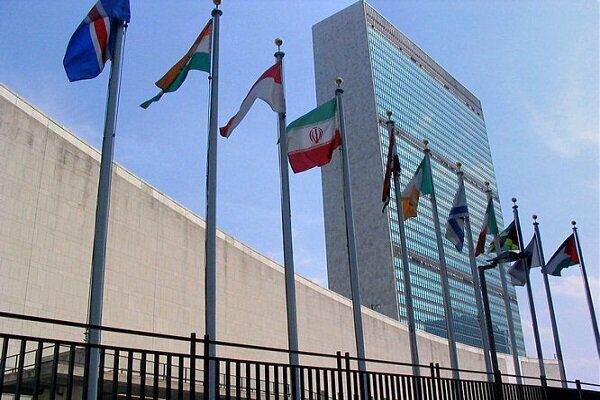Iran’s absence from the vote on the “New York Declaration” in support of the two-state solution for Palestine.
The United Nations General Assembly on Friday, September 12, 2020, voted to approve a resolution that once again emphasized the issue of establishing a Palestinian state with a so-called “two-state” solution. As a result of this vote, the UN General Assembly voted overwhelmingly in favor of a resolution proposed by France and Saudi Arabia that endorses the “New York Declaration” on a peaceful resolution of the Palestinian question and the implementation of the two-state solution, and the establishment of a Palestinian state. The resolution was adopted by 142 votes in favor, 10 against, and 12 abstentions, adopting the “New York Declaration” on a peaceful resolution of the Palestinian question and the two-state solution.
The seven-page New York Declaration is the result of an international conference at the United Nations in July, hosted by Saudi Arabia and France, on the decades-old conflict. The United States and Israel boycotted the event. The plan, which faced opposition from the United States and the Israeli regime, was approved a day after Israeli Prime Minister Benjamin Netanyahu announced that there would be no Palestinian state.
Why was Iran absent?
A noteworthy point in yesterday’s vote was the absence of the Islamic Republic of Iran, as one of the major supporters of the Palestinian cause; an absence that may have created ambiguity in Tehran’s role in the Muslim world’s top issue at the United Nations.
The Islamic Republic of Iran’s position on the Palestinian issue has always been based on the fundamental principle that a lasting and genuine peace can only be achieved when the historical and inalienable rights of the Palestinian people are recognized. Over the past four decades, Tehran has repeatedly stated that the so-called “two-state” solution in the current circumstances is not only incapable of ending the West Asian crisis, but also, by ignoring the main roots of the conflict, actually contributes to the continuation of the status quo. This view stems from the historical experience of the region and its emphasis on the principles of international law regarding the right of peoples to self-determination.
Iran believes that the Zionist project in Palestine is part of a broader colonial project in West Asia that, through the occupation of Palestinian lands and systematic policies of apartheid, has undermined the foundations of any just peace. From Tehran’s perspective, dividing responsibility for the crisis equally between the occupying regime and the occupied people is a clear distortion of the realities on the ground; a reality that encompasses more than eight decades of occupation, crimes, and the denial of fundamental rights to the Palestinian people. Accordingly, the Islamic Republic of Iran has registered the plan to “hold a national referendum among the main inhabitants of Palestine, including Muslims, Christians, and Jews,” as the most democratic path to resolving the Palestinian issue in the United Nations, and is pressing for it.
In a speech at the conference supporting the Palestinian Intifada in 2011, Ayatollah Khamenei, the Supreme Leader of the Revolution, said: “Our demand is the freedom of Palestine, not the freedom of a part of Palestine. Any plan that seeks to divide Palestine is completely rejected. The two-state plan, which has been dressed up as a right-wing “acceptance of the Palestinian state as a member of the United Nations,” is nothing more than giving in to the Zionists’ demands, namely, “acceptance of the Zionist state in the land of Palestine.” This means trampling on the rights of the Palestinian people, ignoring the historical rights of Palestinian refugees, and even threatening the rights of Palestinians living in the lands of 1948; it means remaining a cancerous tumor and a permanent threat to the body of the Islamic nation, especially the nations of the region. “It means repeating decades of suffering and trampling on the blood of martyrs.”

